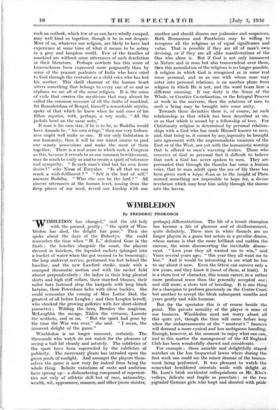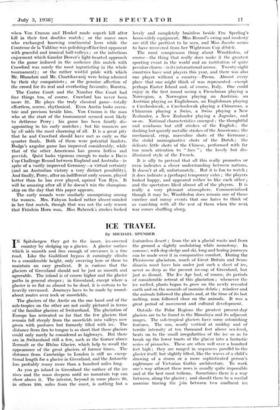WIMBLEDON
By FREDERIC PROKOSCH
IWIITINIBLEDON has changed," said the old lady IT with the parasol, gently ; " the spirit of Wim- bledon has died, the delight has gone." Then she spoke about the days of the Dohertys. She. could remember the time when " H. L." defeated Gore in the finals ; the benches alongside the court, the players dressed in knickers, the lopsided rackets (plunged into a bucket of water when the gut seemed to be loosening) ; the long undercut service, performed ten feet behind the baseline, and the new Lawford stroke, made with a cramped rheumatic motion and with the racket held almost perpendicularly ; the ladies in their long pleated skirts and high stiff collars, their starched blouses, their sailor hats fastened atop the hairpads with long black hatpins, their Petersham belts with silver buckles. She could remember the coming of Miss Lottie Dod, the greatest of all before Lenglen ; and then Lenglen herself, who shocked the growing galleries with her short-skirted pirouettes ; Wilding the hero, Brookes the magician, McLaughlin the savage, Tilden the virtuoso, Lacoste the aesthete, and so on. " But the spirit had gone by the time the War was over," she said. " I mean, the, innocent delight , of the game."
Wimbledon is no longer innocent, certainly. The. thousands who watch do not watch for the pleasure of. seeing a ball hit cleanly and astutely. The sOtleties of. the sport have been superseded by the subtleties of publicity. The mercenary gleam has intruded upon the green pools of sunlight. And amongst the players them- selves the game is now very far indeed from being the -whole thing. Infinite variations of caste and ambition have sprung up : a disheartening compound of superiori-_ ties not only of athletic skill but of race, nationality,, wealth, wit, appearance, Enanner,,andother(more sinister, _ perhaps) differentiations. The life of a tennis champion has become a life of glamour and of disillusionment, quite definitely. These men in white flannels are no longer players in a game but actors in a peculiar drama, whose nature is that the more brilliant and sudden the success, the more disconcerting the inevitable denoue- ment. " Last year they all wanted me to win," said Vines several years ago; " this year they all want me to lose." And it would be interesting to see what he has to say about it now. Even the fittest can survive only a' few years, and they know it (most of them, at least). It' is a stern test of character, this tennis career, in a rather more profound sense than • the generally accepted one; and still more, a stern test of breeding. It is one thing for a champion to perform graciously on the Centre Court but another to accept the bleak subsequent months and years gently and with humour.
But for the spectator this is of course beside the point. The private morality of the player is none of our business. Wimbledon need not worry about all this quite yet, though the time will come before long when the embarrassments of the " amateur's " finances' will demand a more cynical and less ambiguous handling. Enough, however, at the moment to enjoy what one can, and in this matter the management of the All England Club has been wonderfully shrewd and considerate. • • For example : . those amiable and delightfully- staged: matches on the less frequented lawns where -during the first week one could see the- minor dramas of the tourna- ment being performed. It was pleasant to watch the somewhat bewildered orientals smile with delight at Mr. Linn's brisk occidental colloquialisms or Mr. Kho's volleys, delicate and fragile as porcelain ; or the two pigtailed German girls who leapt and shouted with pride • when Von Cramm and Henkel made superb kill after kill in their first doubles match ; or the suave ones who exchanged knowing continental leers while the Comtesse de la-Valdene was polishing off her first opponent with graceful and ironical half-volleys ; or the infectious enjoyment which Gandar Dower's light-hearted approach to the game induced in the audience (his match with Crawford was surely the most ingratiating in the whole tournament) ; or the rather wistful pride with which Mr. Bhandari and Mr. Chartikavanij were being admired by their shy compatriots ; or the genuine affection of the crowd for its real and everlasting favourite, Borotra.
The Centre Court and the Number One Court had fine things too, of course. Crawford has never been. more fit. He plays the truly classical game—totally effortless, serene, rhythmical. Even Austin looks eccen- tric and precious beside him. Von Cramm is the man who at the start of the tournament seemed most likely to dethrone Perry ; his game has been faintly dis- appointing in his early matches ; but his manners are by all odds the most charming of all. It is a great pity that he and Crawford should have met as early as the quarter finals. Both of them were potential finalists. Budge's angular game has improved considerably, while that of the other Americans his grown listless and peevish. Quist looks vigorous enough to make a Davis Cup Challenge Round between England and Australia—in spite of a vastly improved Germany—a virtual certainty (and an Australian victory a very distinct possibility). And finally, Perry, after an indifferent early season, played better than he has ever played, against Van Ryn. It will be amazing after all if he doesn't win the champion- ship on the day that this paper appears.
The early rounds were similarly unsurprising among the women. Mrs. Fabyan looked rather absent-minded in her first match, though that was not the only reason that Fraulein Horn won. Miss Babcock's strokes -looked lovely and completely brainless beside Fru Sperling's housewifely equipment. Miss Round's swing and modesty are still the prettiest to be seen, and Miss Jacobs seems to have recovered from her Wightrnan Cup debdcle.
The most conspicuous thing about Wimbledon, of course—the thing that really does make it the greatest sporting event in the world and an institution of quite peculiar charm—is its international aroma. Twenty-eight countries have sent players this year, and there was also one player without a countryPrenn. Almost every place that one might think of was represented—except perhaps Easter Island and, of course, Italy. One could enjoy in the first round seeing a Frenchman playing a Norwegian, a Norwegian playing an Austrian, an Austrian playing an Englishman, all Englishman playing a Czechoslovak, a Czechoslovak playing a Chinaman, a Chinaman playing a Swiss, a Swiss playing a New Zealander, a New Zealander playing a Jugoslav, and so on. National characteristics emerged : the thoughtful and assiduous but stiff strokes of the English ; the dashing but queerly metallic strokes of the Americans; the mechanical, crisp, masculine shots of the Germans ; the stolid unimaginative shots of the Dutch ; the delicate little shots of the Chinese, performed with far too much attention to " face " ; the lovely but dis- illusioned style of the French.
It is silly-to pretend that all this really promotes or even indicates a closer understanding between nations. It doesn't at all, unfortunately. But it is fun to watch it does indicate a (perhaps) temporary calm ; the players looked happy, and appeared rather to like each other.; and the spectators liked almost all of the players. It is really a very pleasant atmosphere. Comniercialised though it may be, Wimbledon does remain one of those carefree and sunny events that one hates to think of as. vanishing with all the rest of them when the next war comes shuffling along.















































 Previous page
Previous page